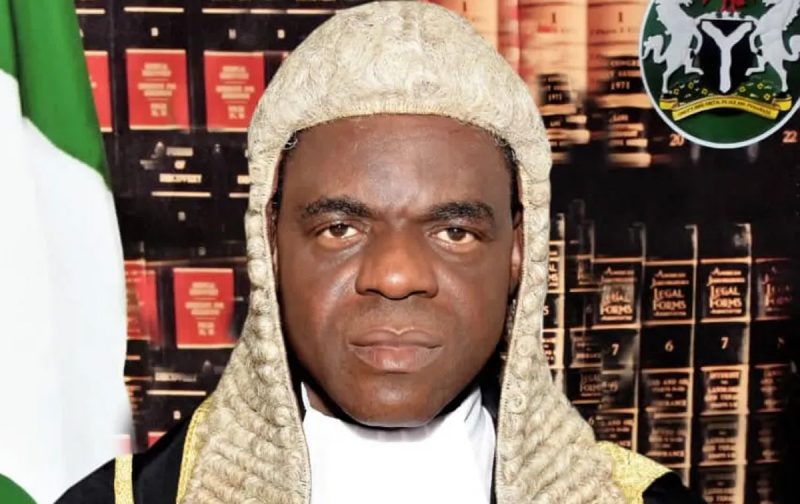

Chief Judge of the court, John Tsoho
The Federal High Court currently has over 128,000 cases in its dockets across its divisions nationwide, the Chief Judge of the court, John Tsoho, said on Thursday.
With 75 judges currently on its bench, it means a judge on the average has over 1,700 cases to handle.
Mr Tsoho who spoke during the the special court session to mark the commencement of the Federal High Court’s new 2021/2022 legal year in Abuja, acknowledged how loaded judge’s dockets had become since the COVID-19 pandemic was brought under control last year.
While giving a breakdown of cases on the court’s docket, the Chief Judge said, “The 2020/2021 legal year officially closed in July, 2021.
“Within that year, (i.e September 2020 – June, 2021), a total of 8, 309 cases were filed.
“There were 40,822 civil cases; 30, 197 criminal cases; 35563 motions and 20, 258 fundamental rights enforcement applications pending at the end of the Legal Year.”
“The total number of cases disposed of during that year was 6, 915 cases; with a total of 128, 234 pending at the end of the Legal Year,” he added.
He noted that after the improvement in the control of the coronavirus, “more and more cases were filed and the dockets of the judges became enormously loaded.”
Mr Tsoho, however, assured that with the appointment of new judges almost completed, “the problems would be tackled headlong.”
He restated his “resolve to enhance effective administration of justice, welfare of judges and staff.”
To actualise the goal, he said, “several practice directions were issued to ensure seamless and robust administration of justice.”
He said despite the low budgetary allocations to the judiciary and the Federal High Court in particular, “the training and retraining of judges and staff have continued.”
Meanwhile, the Body of Senior Advocates of Nigeria (BOSAN) says virtually all of Nigerian states’ structures of accountability have collapsed.
It said democracy has not delivered equal opportunities for all Nigerians as no one is accountable.
A former Attorney-General of the Federation and Minister of Justice, Kanu Agabi, spoke on behalf of BOSAN at the Federal High Court event on Thursday.
Mr Agabi, a Senior Advocate of Nigeria, said judges should not be blamed for the many social ills plaguing the country.
“It is not the fault of our judges that democracy has not yielded equal opportunities for all Nigerians,” he said.
Mr Agabi queried, “What can the judiciary do when in virtually all our states the structures for accountability have been set aside and no one is accountable?”
Mr Agabi advised judges against becoming instrument in the hands of politicians.
“This is a time of high politics in our country,” he said, adding, “The judiciary must ensure that it does not become an instrument in the hands of politicians.”
The former AGF further said, “It will be most tragic indeed if a man’s political enemies are able to get him in court when they have been unable to get him in their political battlefields.”
The event witnessed the commissioning of the Chief Judge’s retroffited court.
Kashim Zannah, the Chief Judge of Borno State, who represented the Chief Justice of Nigeria (CJN), Tanko Muhammad, while commissioning the newly redesigned courtroom, said the National Judicial Council (NJC) had completed all four key components of the judicial information technology policy (JITPO).
JITPO is the NJC’s policy aimed at laying a “nationwide soft infrastructure to enable the emergence of a justice sector electronic ecosystem to automate and enhance justice delivery by leveraging technology,” Mr Zannah explained.
“This court is one of the nine courtrooms of the federal courts retrofitted by the NJC across the nation,” he said, while demonstrating the virtual connectivity of the CJ’s retrofitted courtroom with the Kuje correctional centre in Abuja.
With the electronic gadgets installed in the courtroom, inmates at the Kuje prison can attend their trials from the detention facility, thereby eliminating the hassles that are associated with conveying defendants to court.
Several criminal cases have had to be adjourned on account of logistical issues with inmates transportation.
Mr Zannah also chairs the Judicial Information Technology Committee of the NJC, a body saddled with the responsibility of providing the technical know-how of deploying technology in conducting court proceedings in Nigeria.
Premium Times
Miyetti Allah accuses Benue community of poisoning 20 cows The Benue State chapter of the Miyetti Allah…
Wike's aide slams Atiku, says it's too late to buy integrity Lere Olayinka, Federal Capital Territory…
Reps Committee recovers N21.4bn from four oil companies The House of Representatives claimed it has…
West African juntas impose levy on imported goods ECOWAS nations West African neighbours Mali, Burkina…
Man City secure comeback win at Bournemouth to reach FA Cup semi-finals Erling Haaland and…
Petrol price rises to N935 in Lagos Petrol marketers across the Lagos metropolis at the…